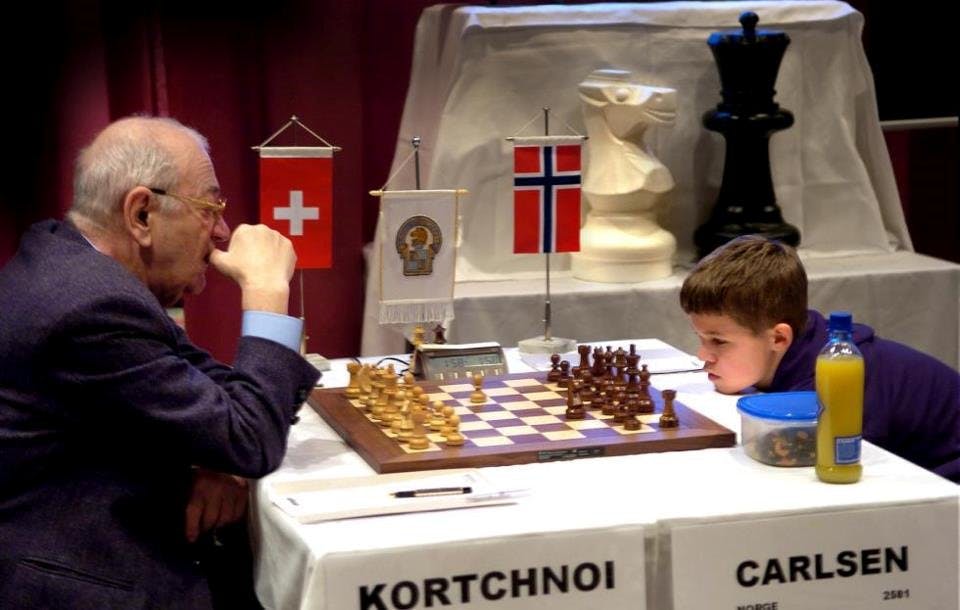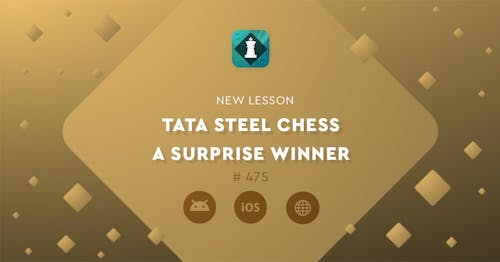Are you sure you want to delete your account?
(This will permanently delete all of your data - purchases, game scores, ratings, etc)
Change your username
Your current username is: guest
Change your account email address
Your current account email is:
Redeem your Fampay code here!
Use your Fampay code to get access to the Play Magnus Plus Membership!

Psychological Tricks in Chess – Part I
To what extent is psychology important in chess? Opinions vary greatly.
On the one hand, Bobby Fischer famously stated: “I don't believe in psychology. I believe in good moves”. This quote reminds us that the outcome of any chess game is ultimately decided on the board.
On the other hand, in more recent times quite a few World Chess Champions have had psychologists on their teams. Most notably, during the Korchnoi vs. Karpov and Karpov vs. Kasparov rivalries hypnotizers and yogi were deeply involved in the matches, allegedly affecting the outcome of some of the pivotal games. Later Viktor Korchnoi went as far as to claim that Magnus Carlsen must posess some sort of hypnotizing stare since super Grandmasters tend to fall apart chess-wise when playing him, losing even “dead drawn” positions.
Today we will discuss a few psychological tips that will hopefully help you improve your results as a practical player.
Tip 1: Remain cool and confident no matter what happens
Staying confident and not tilting is obviously good for your decision-making process. Also, it deprives your opponents of mental energy by making them feel uncertain about themselves and provoking them into questioning their calculations.
Conversely, if you show signs of weakness (shaking your head, breathing heavily, keeping a crooked posture), your opponents will get a morale boost and start looking for a promising continuation even more ardently.
There are two important exceptions to this rule. The first one revolves around setting traps for your opponent. For example, some players, particularly in time trouble, may start shaking their heads or pinching their hair when there is a flawed tactical resource available for their partners. If the unwary prey walks into the trap, the hunter will get back to normal. Also, sometimes such behavior will be demonstrated unintentionally due to genuine miscalculation. Therefore, while it is important to keep an eye on the psychological state of your opponent, you should make the final decisions based on the position on the board.
The second one concerns vivid people who simply can’t keep a poker face. A notable modern day example is Hikaru Nakamura. You can fully expect him to make grimaces and give away other body language signs regardless of whether he thinks he blundered or you have just made a terrible mistake. Therefore, you either ignore these “tells” completely if you realize that your opponent is overemotional, or you study the person thorougly in order to be able to interpret the signs well enough based on intricate nuances that are not visible to the average spectator.
Tip 2: The “I got this messy position from someone else” technique
It is quite typical of chess players to start blaming themselves for forgetting opening preparation, missing a key tactical strike in the middlegame or ending in a gruesome endgame with no counterplay whatsoever. How do you shake off the tension and the frustration?
One of the ways of getting over the dark past is to take a short walk during your opponent’s move and, upon returning to the board, to smile and to tell yourself: “Wow, what a weird position I have been treated to by a friend of mine! I wonder if I can somehow turn the tables on my opponent?!”
In a nutshell, you assign all the blame on your imaginary friend. This way you are no longer overly concerned about losing since it’s your friend who is responsible for all the harm done. However, if you manage to come back from this mess, it is going to be a fantastic achievement on your behalf! Quite a few seemingly hopeless positions have been saved using this technique.
Tip 3: Conceal your area of interest on the chessboard
The less your opponent knows about your real game intentions, the better.
Some chess players (Vasyl Ivanchuk, Alexander Morozevich, et al.) have a habit of occasionally analyzing the current position blindfoldedly, ignoring the board and staring somewhere else in what we would call nowadays “Beth Harmon-style”. This way you can’t tell what’s really going on in their minds.
If you do look at the board, it is useful to send a fake narrative across, hoping to hinder the decision-making process of your partner. Don’t stay glued visually to the part of the board that you are most interested in. For example, if you are worried about the prospects of your opponent attacking you on the kingside, you may act as if you are more concerned about his minority attack on the queenside or your own threat of snatching a pawn on that flank. The opponents who are not self-confident enough may easily be swayed into letting go of their own ideas and switching to the narrative that you are trying to impose on them (“I should probably not go for the attack on his king since losing my pawn on the queenside is so scary!”).
Obviously, there are plenty of other interesting psychological tricks that one can employ in chess. We will continue exploring them in the subsequent episodes.
Home assignment
As you probably know, in the perfect world you are supposed to analyze every game you play, thinking what you could have done differently and coming up with improvements. Most players are well-familiar with this important advice, yet they do not follow it due to laziness, lack of time and other excuses that are not hard to come up with.
However, it is far less common to recommend analyzing all your chess games from the psychological point of view. After the game is over, replay it in your head, focusing specifically on what you and your opponent did right and wrong in terms of psychology.
If something worked out to your benefit, decide whether it is worth using this trick more often. Or, conversely, if your opponent was able to knock you out psychologically, try to come up with an efficient remedy against such behavior and see whether you should add this weapon to your own psychological arsenal.
